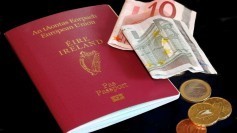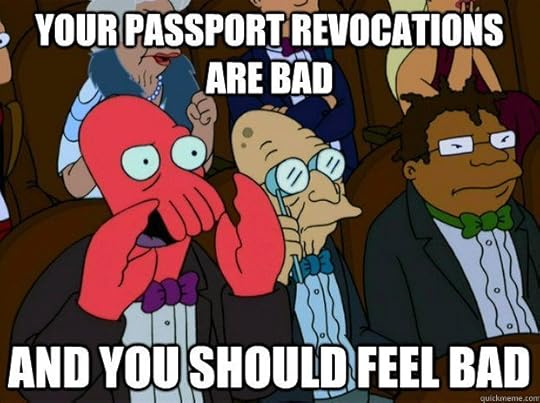Rick Falkvinge's Blog, page 35
October 31, 2012
The Scary Spectre Of Perpetual Copyright

Copyright Monopoly – Wendy Cockcroft: The nightmare scenario of perpetual copyright approaches. The Supreme Court is hearing Kirtsaeng V Wiley, the case of an entrepreneurial Thai student who purchased his textbooks from his native land and imported them into the United States, taking advantage of the price differential. At issue is the question of whether or not you own what you buy. If Wiley wins outright, goods manufactured abroad could actually enjoy copyright protection indefinitely.
Mathematics graduate Supap Kirtsaeng was frustrated that there was such a massive difference between the prices of the textbooks he needed for his course that he arranged to import them from his native Thailand. Relatives purchased the books and sent them over. Then he realised he could make money doing this so he asked them to send more so he could sell them on eBay, making profits of over a million dollars. Wiley found out and sued.
There is a separate provision of U.S. copyright law that prohibits the importation into the United States, “without the authority of the owner of copyright,” of copies of a work “acquired outside the United States.” – Slate
This is what got Kirtsaeng into trouble. He owned what he bought, via his relatives in Thailand. As soon as they entered the country, Wiley had ownership and Kirtsaeng required a license. The law is unambiguous:
(1) Importation.—Importation into the United States, without the authority of the owner of copyright under this title, of copies or phonorecords of a work that have been acquired outside the United States is an infringement of the exclusive right to distribute copies or phonorecords under section 106, actionable under section 501. – Importation and Exportation, US Copyright Law
But so is First Sale Doctrine, which Kirtsaeng used as his defense:
an individual who knowingly purchases a copy of a copyrighted work from the copyright holder receives the right to sell, display or otherwise dispose of that particular copy, notwithstanding the interests of the copyright owner. – Criminal Resource Manual 1854: Copyright Infringement—First Sale Doctrine
The case hinges on the fact that Kirtsaeng’s relatives bought the books from shops, thus exhausting the copyright entitlement and invoking First Sale Doctrine. Wiley contends that First Sale Doctrine begins and ends at American ports and borders.
In August 2011, the U.S. Court of Appeals for the Second Circuit upheld a lower court’s ruling that anything that was manufactured overseas is not subject to the first-sale principle. Only American-made products or “copies manufactured domestically” were. – Marketwatch
Lower courts have accepted and upheld the publisher’s right to market segmentation, and found Kirtsaeng guilty of copyright violations. The upshot: you don’t own what you buy, you’re only renting it, as Doc Searls warned in February. The implications of a victory for Wiley could impact us all in bizarre new ways. Imagine buying a copy of the newspaper USA Today in Dublin, then taking it on a flight to New York. You get asked by a customs guard on the other end where you bought it and are promptly fined for copyright violations based on the importation law. You couldn’t donate goods bought abroad to a charity shop. You couldn’t sell a used car. You certainly couldn’t sell goods on eBay. Garage or car boot sale? Forget it, unless you apply for and receive a license to display to any policemen or copyright enforcement agents to appear on the day. Now try to imagine the problems faced by museums and art galleries, all because you don’t own the foreign-bought item you possess.
Realising the implications for copyright and IPR law, Deputy Solicitor General Malcolm Stewart was despatched to the court to argue the case and maintain the system as it is, since a win for Wiley would trigger a backlash that could undo the IPR system altogether. His solution?
By tying their decision to a 1909 case called Bobbs-Merrill, the court could allow copyright owners to shut down unauthorized distributors like Kirtsaeng but avoid the more extreme position that Wiley has found itself fighting for, said Stewart. (If Wiley wins outright, goods manufactured abroad could actually enjoy copyright protection indefinitely.) Copyright owners could get some control over imports, without granting them control over all downstream sales. – Ars Technica
If that is accepted, it grants copyright holders control only imports, not downstream sales from within its borders. This is problematic because it still means that the holder of an item that’s within copyright must obtain a license to distribute or sell it if it’s been imported. What happens with orphan works? How do you enforce this? And what will happen to eBay, Craigslist, and platforms like that? Online shopping just became more awkward. Help is at hand, though.
 Take action now!
Take action now!The people at Demand Progress have created a campaign featuring these nifty little balls and chains to display on your website to highlight the absurdity of the copyright situation. A petition is available for US residents to sign at You’ve Been Owned to demand that the President defend the property rights of American citizens. Please take part and share the link liberally on the social media. Don’t let these people get away with it!

The Scary Spectre Of Perpetual IPR

Activism – Wendy Cockcroft: The nightmare scenario of perpetual copyright approaches. The Supreme Court is hearing Kirtsaeng V Wiley, the case of an entrepreneurial Thai student who purchased his textbooks from his native land and imported them into the United States, taking advantage of the price differential. At issue is the question of whether or not you own what you buy. If Wiley wins outright, goods manufactured abroad could actually enjoy copyright protection indefinitely.
Mathematics graduate Supap Kirtsaeng was frustrated that there was such a massive difference between the prices of the textbooks he needed for his course that he arranged to import them from his native Thailand. Relatives purchased the books and sent them over. Then he realised he could make money doing this so he asked them to send more so he could sell them on eBay, making profits of over a million dollars. Wiley found out and sued.
There is a separate provision of U.S. copyright law that prohibits the importation into the United States, “without the authority of the owner of copyright,” of copies of a work “acquired outside the United States.” – Slate
This is what got Kirtsaeng into trouble. He owned what he bought, via his relatives in Thailand. As soon as they entered the country, Wiley had ownership and Kirtsaeng required a license. The law is unambiguous:
(1) Importation.—Importation into the United States, without the authority of the owner of copyright under this title, of copies or phonorecords of a work that have been acquired outside the United States is an infringement of the exclusive right to distribute copies or phonorecords under section 106, actionable under section 501. – Importation and Exportation, US Copyright Law
But so is First Sale Doctrine, which Kirtsaeng used as his defense:
an individual who knowingly purchases a copy of a copyrighted work from the copyright holder receives the right to sell, display or otherwise dispose of that particular copy, notwithstanding the interests of the copyright owner. – Criminal Resource Manual 1854: Copyright Infringement—First Sale Doctrine
The case hinges on the fact that Kirtsaeng’s relatives bought the books from shops, thus exhausting the copyright entitlement and invoking First Sale Doctrine. Wiley contends that First Sale Doctrine begins and ends at American ports and borders.
In August 2011, the U.S. Court of Appeals for the Second Circuit upheld a lower court’s ruling that anything that was manufactured overseas is not subject to the first-sale principle. Only American-made products or “copies manufactured domestically” were. – Marketwatch
Lower courts have accepted and upheld the publisher’s right to market segmentation, and found Kirtsaeng guilty of copyright violations. The upshot: you don’t own what you buy, you’re only renting it, as Doc Searls warned in February. The implications of a victory for Wiley could impact us all in bizarre new ways. Imagine buying a copy of the newspaper USA Today in Dublin, then taking it on a flight to New York. You get asked by a customs guard on the other end where you bought it and are promptly fined for copyright violations based on the importation law. You couldn’t donate goods bought abroad to a charity shop. You couldn’t sell a used car. You certainly couldn’t sell goods on eBay. Garage or car boot sale? Forget it, unless you apply for and receive a license to display to any policemen or copyright enforcement agents to appear on the day. Now try to imagine the problems faced by museums and art galleries, all because you don’t own the foreign-bought item you possess.
Realising the implications for copyright and IPR law, Deputy Solicitor General Malcolm Stewart was despatched to the court to argue the case and maintain the system as it is, since a win for Wiley would trigger a backlash that could undo the IPR system altogether. His solution?
By tying their decision to a 1909 case called Bobbs-Merrill, the court could allow copyright owners to shut down unauthorized distributors like Kirtsaeng but avoid the more extreme position that Wiley has found itself fighting for, said Stewart. (If Wiley wins outright, goods manufactured abroad could actually enjoy copyright protection indefinitely.) Copyright owners could get some control over imports, without granting them control over all downstream sales. – Ars Technica
If that is accepted, it grants copyright holders control only imports, not downstream sales from within its borders. This is problematic because it still means that the holder of an item that’s within copyright must obtain a license to distribute or sell it if it’s been imported. What happens with orphan works? How do you enforce this? And what will happen to eBay, Craigslist, and platforms like that? Online shopping just became more awkward. Help is at hand, though.
 Take action now!
Take action now!The people at Demand Progress have created a campaign featuring these nifty little balls and chains to display on your website to highlight the absurdity of the copyright situation. A petition is available for US residents to sign at You’ve Been Owned to demand that the President defend the property rights of American citizens. Please take part and share the link liberally on the social media. Don’t let these people get away with it!

October 29, 2012
Is it Time to Police the Police?

Civil Liberties – Andrew Norton: Every week, somewhere in the US, there’s a story of some kind of police activity that leads people scratching their head, or saying ‘That isn’t right’. It’s an issue that’s been around as long as police officers have and has become a cliche, accepted without question. The problem is that it’s a problem that’s only getting worse, not better, and it’s a problem that’s not being addressed.
Law Enforcement – the name sounds majestic, but the reality is anything but. On the streets today, a number of police officers will conduct crimes, and face not even casual questioning of it, much less any sort of punishment. It has truly turned into a world where people are above the law.
This was an issue I started thinking about at Dragon*con when we ran the annual panel of ’10 rules for dealing with the police’. Our expected speakers cancelled at the last moment, so we solicited tales from the audience. In the end we had three people who had bad experiences with police officers, two of them were former Law Enforcement officers themselves. If you want to hear their stories, the audio is available on the track’s archive site.
Then there was this story at ArsTechnica, A plain-clothes officer, in an unmarked car, stopped a teenager who was going through a park on his way home, then physically tackles the kid because he decided to videotape it, while sitting on the ground complying. Now, if you or I had attacked a kid, and there was evidence of it, we’d be locked up and waiting to see the judge. This officer is on ‘desk duty’. Not arrested, not imprisoned, but still working for the police department and being paid.
One of the most famous incidents of police brutality was Lt. Pike, at UC Davis. The infamous pepper-sprayer, who used a chemical weapon in violation of it’s guidelines on use, and did so on a group of seated individuals. If you need to be reminded, here it is again.
Indeed, there are now TENS OF THOUSANDS of videos on youtube showing officers violating the law, committing criminal acts, or condoning them through inaction.
There have been instances in the UK as well. Two famous cases occurred in London, In 2005 there was the killing of Jean Charles de Menezes, and in 2009 the death of Ian Tomlinson. Both were killed by police officers, and had committed no crime.
de Menzes death was at the hands of the SAS-trained SO19 firearms squad. They believed him to be someone else, involved in bombing the previous day. Regardless, the officers charged him down, threw him to the floor, and fired. Seven shots to the head, and one to the shoulder. They had mistaken him for a suspect that lived in the same building, a fatal mistake for de Menezes.
Such a serious flaw would naturally lead to arrests, trials, etc. yes? No. Cressida Dick, the person in charge of the operation, has been promoted twice since then, and is now the Assistant Commissioner for Special Operations. None of the firearms officers involved were disciplined, or even identified publicly.
Ian Tomlinson is, if anything, worse. A man attempting to get home from his place of work during the G20 protests is quite literally attacked by police officers. He was attacked from behind; and thrown to the floor. When on the floor, he remonstrated with police, then was helped to his feet by a protester, and started to walk off. Some 60meters (200ft) down the road, he collapsed. He never got up. When passers -by (including a news photographer) attempted to give medical assistance, the police forced them away. Tomlinson died before he reached the hospital.
Despite Tomlinson offering no resistance, doing nothing but standing with his hands in his pockets, a full-strength strike was performed by PC Simon Harwood, on the back of Tomlinson’s legs; followed by pushing him to the ground, where his head struck the pavement. He had committed no crime, had ignored no order, his only ‘crime’ was to be present. It wasn’t until this footage was found, that the police even admitted any misconduct had happened, instead they flat-out lied about it.
The aggressor, PC Simon Harwood, was finally fired last month by the Met for his actions, the second time he’d left the London force. In the late 90s he left on medical grounds and was awarded a medical pension, coincidentally while waiting to face a disciplinary board for misconduct in aroad rage incident.
The problem seems to be increasingly exacerbated by the ‘threat aware’ mentality of police officers these days. Officers are seeing every interaction in terms of threats, and a need to control the situation. This domination mind-set invariably starts things off on the wrong foot and leads to confrontation and distrust.
But exacerbating it is the ‘closed ranks’ mentality – the ‘blue shield’ that protects officers. It usually shows itself as ‘Omertà and is nearly impossible to penetrate.
Those that do, such as the NYPD officer Frank Serpico (who testified about systemic corruption in the NYPD in the late 60s/early 70s, after being shot and abandoned on a drugs raid), are often ostracised. When Serpico got the departments not medal, the ‘New York City Police Department Medal of Honor’ It wasn’t in a ceremony, it was without the pomp and circumstance you would expect, because not only were they ashamed of it, they didn’t want to encourage others.
And this doesn’t even come close to the problems when it’s the chiefs, and not just the patrolling officers that have the problem, such as Sheriff Joe Arpaio, who has had his jails ruled unconstitutional, and has been investigated for intimidation and abuse of power. But what can you do? Walk up and arrest him?
All in all, we’re seeing a ‘consequence of no-consequences’, as rights and procedures which would be followed for your or I, are ignored for actions performed by law enforcement.
So, what should we do? That’s something that will be addressed in part two, but if you have suggestions, by all means leave them in the comments.

October 27, 2012
The Next Big Battles

Activism – Wendy Cockcroft: Since ACTA was decisively beaten on 4th July 2012, the first time a free trade agreement had been scuppered by the people of EU member nations, the big business lobbyists have taken heed and resolved to change in order to be more successful. Hence the secrecy. CETA and the EU-India trade agreement are the next big battles. We need your help.
The term “Free Trade Agreement” is a misnomer. The idea is to remove barriers, taxes, and tariffs, but since people can end up being shackled to a multinational corporation’s agenda, the only freedom is in the ability of the corporations to operate in ways that often end up utterly destroying local economies or harnessing law enforcement agencies to protect their interests. The worst part is that we the taxpayers have to foot the bill for our losses of national sovereignty and civil rights. We saw ACTA off in July, but there are two more major agreements to deal with and we need to be ready to contact our M.E.P.s when the time comes.
CETA
CETA is the Canada-Europe Treaty Agreement. It’s so bad, Canadian cities and local authorities want to be able to opt out of it. The issues they’re having centre on the onerous procurement rules that would favor European corporations over local suppliers but there are implications for the internet, too, in the form of the ACTA-style intellectual property chapter, which Dr. Michael Geist published on his blog. It’s only an old leaked draft, but getting hold of the actual documents has been an exercise in frustration. However, it seems that Bilaterals.org has been able to preserve a copy of the Draft Consolidated Text. Despite the lack of information available, tech blogs such as Techdirt and Computerworld are picking up the story.
EU-India FTA
The European Union has been secretly negotiating a free trade agreement with India since 2007 that is worryingly similar to ACTA. Intellectual property rights enforcement would include border detention and seizure measures of goods being imported by India, exported by India or in transit via India’s ports or airports. This could affect the generic drugs that India produces for its people. Needless to say, intellectual property rights are on the menu, mostly for pharmaceuticals, it has to be said, but since we have no access to the documents involved it’s fair to say it’s likely to include internet provisions, too. David Martin MEP, rapporteur for the European Union’s International Trade Committee, whose recommendations helped to pull ACTA down in July, is joining unions and international NGOs to oppose the treaty and the secrecy that goes with it. Indian business groups agree, fearing that European imports will jeopardize local production.
It is essential that we mobilize opposition to these free trade agreements, not just because they are unjust, but because, if they are ratified, they will bring back the spectre of ACTA, just as E.U. Trade Commissioner Karel De Gucht assured us back in July.
Let’s make sure that doesn’t happen.

October 21, 2012
Pirate Parties Win First Senator’s Seat, Czech Win International Race

Pirate Parties: Czech Pirate Libor Michálek won his district’s election yesterday, and was thereby elected Senator. Michálek is a well-known fighter in the Czech Republic for transparency, human rights, and civil liberties, and was running for senate with the Czech Pirate Party. This also means that the Czech Pirate Party has won the international race to national-level legislatures.
Libor Michálek was elected in a two-step election in the Prague 2 and 3 district, the most-watched district in all of the Czech Republic. Michálek ran on a Pirate ballot, but was also supported by the Greens and Christian Democrats. In the first step, he got 24% and qualified for a runoff with his primary opponent. In the runoff on October 19 and 20, he got almost 75% of the votes – thus getting elected senator, a first for the Pirate Party movement.
The race for national parliaments between the Pirate Parties has been on since 2006, and it has remained uncertain which country’s Pirate Party would win it. In Sweden, the Piratpartiet put two people in the European Parliament in 2009 (winning the race to international parliaments), but failed spectacularly in the next year’s national-level elections. Germany, a longstanding favorite, has its Piratenpartei putting 45 people in state-level parliaments, but the national-level elections are not due for another year. In Netherlands, the Dutch Piratenpartij missed a seat in the national legislature by a mere 0,3%. This race is now over, and the Czech Pirátská Strana has won.
Congratulations on your new job, Senator Michálek!
From Czech Wikipedia, via Pirate Times:
Michálek is famous in his own country as a whistleblower for exposing corruption in 1996, when he worked for the National Property Fund. In 2010, his complaints about fraudulent manipulation of procurement and tendering led to the dismissal of ministers and top officials. In March 2011, he was awarded the Endowment Fund Against Corruption Prize. In May 2011, he was awarded the František Kriegel Award from Charter 77 for the outstanding achievements in the struggle for human rights and civil liberties.
In July 2012, he announced that he would stand for the Senate in District 26 as a Pirate. He went on to win the first round with 24.3% of the votes. In the second round, he was elected senator with 74.4% of the votes.
It is particularly noteworthy, especially for our American, Canadian, British, French, and Australian colleagues, that senator Michálek was elected in a first-past-the-post system.
This is important, because the initial Pirate Party concept assumed dependence on a different system. In most countries in Europe, if you get 5% of the votes nationwide, you get 5% of the seats in parliament. This is called proportional representation. Some countries – like the US – have a completely different system, where you need a majority in a certain area (a constituency) to get a single seat. This is called first-past-the-post, and obviously, getting 51% of the vote in a fairly large area is a completely different ballgame than getting 5% nationwide.
We have long known that we are capable of getting 5% of the vote. As of today, we know that we’re also capable of winning first-past-the-post elections and getting 51%, even in capitals.
“This means that Pirates have gained representation in the Senate. Libor Michálek is now facing the difficult task of working with making the financial affairs of the state and public institutions fully transparent. As a senator, he will also have better access to documents, and we expect that he will continue to draw attention of the public to the current problems and cases”, says Jakub Michálek, 1st vice president of the Czech Pirates – and a namesake of Libor Michálek – in a press release.

October 19, 2012
Stallman Endorses Pirate Party Position on Trademarks, Patent and Copyright Monopolies

Infopolicy: In a welcome gesture on October 16, Dr. Richard Stallman made a public note supporting the Swedish Pirate Party’s position regarding trademarks, patent monopolies, and copyright monopolies.
The article summarizing the party positions has been posted here earlier in a translation from a Swedish original. In a nutshell:
Patent monopolies are counterproductive to innovation, and the entire patent system needs to go. Only the pharma industry needs re-regulation, which can be accomplished by opening up research from today’s healthcare subsidies and still saving tax money.
Trademarks are okay as long as they protect consumers from fraud, etc, but never okay when they punish consumers.
The copyright monopoly needs to be cut down to a baseline commercial-use monopoly of five years, extendable to 20 years through registration, and remixes are always ok, while digital restriction mechanisms are never so.
This is a large step forward in the long-standing discussion between the Pirate Party movement and the Free Software movement about the effect of copyright reform on the GPL and free software. Several activists have worried about the standing of free software and the GPL, which depends on copyright monopoly law for its enforcement of code freedom, when that mechanism is weakened – but Dr. Stallman has previously pointed out that it is a feature of the GPL that it scales with the strength of the copyright monopoly laws.
Additionally, as registration of a work is required to extend the baseline commercial monopoly to 20 years in the Swedish Pirate Party’s position, this provides a possible future legal hook for source code escrow mechanisms – for the source code to be made public on expiration of the monopoly – in exchange for the state granting an extension of the commercial monopoly. This hook isn’t present in today’s legal framework.
With Dr. Stallman’s note of agreement with these positions, I believe that this discussion will make it possible for our movements to align against the external threat, and also that such an alignment is necessary for a long-term victory for the freedom to code, create, and innovate without asking permission.
Dr. Stallman rightly points out, however, that it is unfortunate to describe the three laws of trademarks, copyright monopolies, and patent monopolies (and no other laws) in the same article, as it reinforces the counterproductive idea that these unrelated laws should be grouped together.

October 15, 2012
600 Days To Go Until European Elections In 2014: Why The Pirate MEPs Are Needed In Brussels

Pirate Parties: As this article gets published, it is exactly 600 days until the European Elections open at 08:00 on June 8, 2014. What has the Pirate Party accomplished in Brussels so far in this term, and why is it necessary to keep them in Brussels? Let’s take a look.
In 2009, the Swedish Pirate Party got one Member of European Parliament elected to the European Parliament, followed by a second about half-term as the Lisbon Treaty took effect. I’d dare say that the impact of these people has been formidable so far, and would like to illustrate just how large an impact these people have had – and why it’s imperative to keep them there as a line of defense for the foreseeable future.
In short: Without them, there would now be a “three-strikes” scheme in Europe, and ACTA would most likely have been in global effect. The political support for copyright monopoly reform has grown by orders of magnitude, and finally, there are subtle but very important changes in the language used by Parliament.
Let’s take them in detail, one by one:
1. The Pirate MEPs were necessary to stop ACTA.
Without the Pirate MEPs, ACTA would be a global treaty today well on its way to coming into force, with all what that means.
Take careful note that I don’t say here that the Pirate MEPs where sufficient for victory on their own, which they certainly weren’t, but I am saying they were necessary for victory. Our first MEP, Christian Engström, had been relentlessly grinding the issue since 2009, when everybody else considered it a done deal. But through unwavering activist pressure from the outside, combined with MEPs on the inside who could explain in the legislative corridors what all the protests were about, the European Parliament turned and ACTA died globally.
Of course, you’ll hear many politicians taking credit for this victory, after having changed their minds following the large-scale street protests in 2012. But there is a very large political difference in having an opinion when asked, and actually spending your working day pushing an issue. To illustrate:
There is a difference between having an opinion on football, and actually playing football.
Everybody who voted the right way should have due credit, of course, but this particular article is about what use we’ve had for the Pirate MEPs have done in Brussels so far.
It wasn’t just the soft issues and working on the inside, either. Pirate MEP Andersdotter’s draft report on ACTA (“reject”) was carried in the Industry Committee as a whole. MEP Gallo’s draft report on ACTA (“accept”) was rejected in the Legal Affairs committee with the narrowest possible of margins – and Pirate MEP Engström was one of the ones voting against it.
2. A Pirate MEP made “three-strikes” schemes illegal.
The very first victory in Brussels was the so-called Telecoms Package, which had gone through a number of bureaucratic hoops on its way to becoming law. As Pirate MEP Engström took office, it was down to a roundtable negotiation between the European Parliament, the European Commission, and the European Council – the last step if Europe’s institutions can’t agree. MEP Engström was one of the people in Parliament’s delegation, and together with his colleague MEP Albrecht in the Green group, managed to turn this from a done deal to something where the dignity of Parliament itself was at stake.
Various lobby-rich institutions wanted the ability to cut people off from the Internet after mere allegations of wrongdoing in their eyes, and they wanted the ability to do so en masse. By requiring something as basic as process of law for revoking a fundamental right (for access to the net is indeed a fundamental right today, as we exercise our other fundamental rights through it), the plans of the copyright industry to kill our civil liberties en masse by so-called “three strikes” schemes was stopped abruptly.
Specifically, it was determined at the time that the telecoms package must pass the “Hapopi test” – meaning, it must make the French Hadopi law and authority illegal. Through a great deal of Pirate MEP Engström’s footwork (as well as contributions from many activists outside Parliament that put pressure from the outside), this was also the end effect. “Three strikes” schemes are now illegal in the entire European Union.
(To this day, France continues to ignore this fact.)
Again, having the Pirate MEP in the European Parliament’s delegation was far from sufficient for victory. But his presence was necessary for victory.
3. Grown support for copyright monopoly reform.
Since taking office, the political support for a thorough reform of the copyright monopoly has grown from being two pirate MEPs to now being the mainline position of one of the major political groups: the entire Green group has taken the position of legalizing all noncommmercial file-sharing, cutting commercial protection times to (at most) 20 years, requiring registration of works for a continued commercial monopoly, banning DRM, and allowing remixes, mashups, and quotations. (This proposal is summarized in the book The Case For Copyright Reform.
Before the Pirate Party MEPs took office, this was considered an absolutely impossible and highly improbable position to ever succeed. Today, it’s becoming a mainline proposal through the persistent political footwork in Brussels of the Pirate MEPs – but politics take time, and much more work is needed to push it over the 50% barrier.
4. Contribute with, and instill, sense and proper language.
Perhaps the greatest contributions so far are the ones that aren’t very visible on the outside – those of framing the political discussion in proper language. Wherever there’s a pirate MEP, the copyright maximalists’ language will be shot down in a heartbeat.
You can observe that you don’t hear childish expressions like “copyright theft”, “piracy” or similar ridiculous terms out of the European Parliament any longer (except where “piracy” actually refers to robbing on the high seas, as defined by the United Nations). You will also note that you don’t hear the equally childish conflation “piracy and counterfeiting”, deliberately equating teenagers sharing music with counterfeit fatal medicine. Through hard and persistent work, our MEPs have pointed out improper and biased use of language, re-framing the entire debate out of the copyright lobbyists’ and the monopoly maximalists’ hands. This is subtle, but lays the foundation for the political work yet to come.
You may also have noted that language that was considered absolutely politically impossible before the Pirate entry into the European Parliament is starting to pass Parliament’s committees. This report, for instance, recently passed the important International Trade Committee – the same committee that owned ACTA – by a 25-4 majority, with my highlights:
[the committee] is aware that there is concern that some people increasingly hear the word copyright and hate what lies behind it;
[the committee] calls on the Member States and the Commission to develop IPR policy in order to continue to allow those who wish to create their own content and share it without acquiring IPR to do so;
This language is extraordinary. Not just the first paragraph, which is extraordinary enough; this is a call for abolishing the silly copyright monopoly rules about the “clearance culture” that prohibits creators from creating something larger out of smaller components, and would instantly undo ridiculous lawsuits against parents who post videos of dancing toddlers with The Simpsons running on a TV in the background.
Yes, the report was drafted by Pirate MEP Andersdotter, and it was globally noted through the keen eyes of Glyn Moody.
You will note that this, allowing remixes and mashups, is a part of the proposal to reform the copyright monopoly overall – and this shows that support is growing well beyond the Green group in the parliament through persistent and tenacious political footwork, passing the heavyweight International Trade Committee.
Conclusions
Basically, I wanted to highlight what the Pirate MEPs are doing for your liberty in the European Parliament. Without them, there would now be a “three-strikes” scheme in Europe, and ACTA would most likely have been in effect.
They are doing tremendously important work already, and are needed not only to keep doing that work and defending your liberties against the relentless onslaught from lobbyists, but also to keep turning the tides long-term and making reform happen, pulling the teeth from the monopoly lobbyists, one by one.
600 days to go until the elections on June 8, 2014.

October 12, 2012
What The Swedish Pirate Party Wants With Patents, Trademarks, And Copyright

Infopolicy – Christian Engström: This afternoon, I’ll make a presentation to a group of patent lawyers in Stockholm, with the title “What does the Pirate Party want with Patents, Trademarks, and Copyright?”. Here’s a rough summary of what I’m about to tell them, including a few links that will probably get mentioned.
Patents should be abolished as soon as possible. An increasing amount of research, predominantly in the United States, shows us that the patent system as a whole has a negative effect on society. It can be positive for specific actors (mostly pharma companies and patent trolls), but for society as a whole, the patent system is damaging to innovation, to competition, and to economic growth.
The study The Case Against Patents (25 pages) by Michele Boldrin and David Levine at Washington University in St Louis is a good read on our view of the patent system (summary here).
When it comes to pharmaceutical patents, we agree that it’s not feasible to abolish the patent system and hope that the market makes sure enough research just happens anyway. Therefore, we’d like to replace pharmaceutical patents with the system known internationally as delinkage. It means that pharmaceutical research is financed directly from the public coffers, with research results made freely available for anyone to use in any way, spurring a free competition between manufacturers of generic (non-patent-encumbered) drugs. This system would save at least half of the taxpayers’ bill for pharmaceuticals, while at the same time channeling more money to research. As a positive side-effect, besides the savings, it would also save hundreds of thousands – or millions – of lives in the third world.
When it comes to patents in all other areas, we’re willing to listen to anybody and everybody who believes they can show that the patent system provides any kind of net positive effect to society in additional areas, but so far, nobody has been able to show such a net positive (with the exception of pharma). In every such case, the burden of proof is on those who argue for an introduction or continuation of these governmentally-sanctioned monopolies, and not on us who argue for their abolition.
Trademarks are basically good, as they primarily serve as consumer protection. If it says “Coca-Cola” on the can, I know that The Coca-Cola Company guarantees its quality. If I am dissatisfied with the product, I know where I can go to complain, but if I like it, I also know where I can go to get more. This also gives the trademark system a long-term effect of rewarding good and honest companies. While this is a positive effect, the protection of consumers is the foundation and the most important.
In some countries, like France and Italy, the trademark rights have grown to also include punishments for consumers who buy counterfeit goods (either because they want to, or because they were fooled to). This is a bad development that we’re firmly against. The legitimacy of the trademark system comes from protecting consumers. Should it be distorted into legislation that punishes consumers, like patents and copyrights do, it would lose its legitimacy.
Compared to patents and copyrights, it seems that the trademark business has kept their house cleaner against degenerate subversion, and the trademark practices haven’t fallen for the same unhealthy expansion as the patent and copyright laws have. There have been a few upsetting cases of abuse or attempted abuse, like when Louis Vuitton tried to censor a Danish artist “to protect its brand” (it’s likely they haven’t done anything more damaging to the brand in modern years), or when a guitar maker who got the phrase “Born to Rock” registered as a trademark for guitars starts suing T-shirt vendors to ban them from printing the phrase at all, despite clearly not being used as a trademark in the latter case.
This type of abuse must be fought down, primarily by the industry itself, secondarily by the courts, and tertiarily by legislators if nothing else works. But the foundation of trademark law remains sound: forcing and rewarding honesty towards consumers.
Copyright must be reformed. We’d like to keep the copyright monopoly for commercial use (but with shorter, more sensible terms of protection). The big problem is that copyright has expanded in the past 20 years, going from being something that only corporations needed to care about, into something that criminalizes the entire young generation (and more and more people who aren’t even particularly young anymore).
The Swedish Pirate Party wants to;
Legalize file-sharing and other non-commercial sharing of culture between private individuals, both up- and downloading. As a direct consequence, search engines like The Pirate Bay will also be legal, as nobody can be charged with “aiding and abetting” an activity that is fully legal in itself (the file-sharing between private individuals).
At most 20 years of protection from the publication of a work. Among other things, this also solves the problem with orphan works and the “black hole of the 20th century”.
Registration after five years. Rightsholders who want to keep using their commercial monopoly after the first five years must register their works, so that commercial users who want to pay for use know where they can get a license to do so. This also solves the problem with orphan works.
Sensible regulation for quotations, parodies, and remixes even when it comes to audio, video and more (today, you can only quote text – Ed.), and a harmonization within the EU of exceptions to copyright (“exceptions and limitations”).
A ban on DRM (digital restriction mechanisms), or at a bare minimum, making it explicitly legal to break digital restriction mechanisms if needed for any use that is itself legal.
If we reform copyright law according to this proposal, it would solve 99% of the serious problems that today’s copyright causes, while at the same time, 99% of the business models that work today in the entertainment and cultural sectors would keep doing so if the companies would adapt ever so slightly to a new world.
It’s not just the Swedish Pirate Party that thinks copyright law should be reformed like this. Since one year back, it’s also the official position of the entire Green group in the European Parliament.
There’s more on this proposal for copyright reform in the book The Case For Copyright Reform, written by me and Rick Falkvinge, the founder of the Pirate Party. The book is available for a free download as an e-book, or available at-cost as a print-on-demand book, at copyrightreform.eu.
This is a translation of an article originally in Swedish at MEP Engström’s blog.

October 11, 2012
The Danger To Privacy Isn’t Corporate Data-Mining Or Governmental Surveillance – It’s Both Combined

Privacy: The past year, something of a pointless debate has broken out – whether it’s the governments’ ridiculously-broad surveillance laws that pose the greatest threat to our future liberties, or if it’s the corporate gluttonous collectors of data like Google and Facebook that pose the greatest threat. It’s neither, because it’s both combined.
There’s a difference in culture on different sides of the Atlantic. In Europe, people tend to look to governments to protect them from abusive corporations; in the United States, people tend to look to corporations to protect them from an abusive government.
There’s certainly reason to seek protection from both these days. Let’s start with corporations.
It is said that a Visa executive – as in Visa, the credit card system – can predict your divorce one year ahead of yourself, based on your buying habits. There’s a recent telling anecdote where Target, the chain of stores, knew that a teenage woman was pregnant before her parents knew. If our purchase habits give away our life and privacy to this degree – imagine what Google or Facebook would be able to predict, if they wanted to?
Imagine you were diagnosed with a horrible and rare disease – like pancerebral aposcrupulosis, a normally rare disease with above-average occurrence in the political profession. Who would be the first to know about your rare and horrible disease after your doctor and yourself? Not your parents, not your children, not your spouse(s), not your close friends. Google would be the first to know, as you would immediately sit down to learn more about your diagnosis. (Unfortunately, in this particular degenerative disease, patients usually lack awareness of their condition.) Google’s ability tap into what we’re thinking about is probably the closest thing we’ve come yet to actual mind-reading.
Facebook isn’t a threat so much in terms of what you’re thinking, but in terms of who you know. Your patterns can be predicted from their patterns.
However, neither Google nor Facebook have any particular interest – nor indeed any ability – to knock down my door at dawn with a dozen agents with riot gear and automatic weapons just because they don’t like how I use their service. Fact is, they even have a strategic interest in preventing themselves from doing that to me because of my relationship with them: if that happens to one person, it’s a signal it can happen to any one of the billion people that use Facebook or the billion people that use Google (June 2011), and that would seriously harm the corporation in question.
So let’s instead jump to what governments can do. Many enough countries now have blanket wiretapping laws in place that let them wiretap all their own citizens’ net traffic, all other citizens’ traffic, or both. (This would have been absolutely unthinkable just a decade ago.) Additionally, the security services generally share raw data between them – so just because you’re not tapped in your home country, that doesn’t mean your local security service doesn’t have a copy of everything you’ve ever typed or sent online; it can be tapped anywhere.
Governments are not only able to knock down your door when you behave in a way they don’t approve of. They even like doing exactly that, and see it as their job. This is something of a problem, and quite a severe one.
The obvious next step to prevent the governments from this outrageous intrusion – mindreading followed by door-busting – is encryption. Encrypt everything and everywhere. Facebook seems to have gone encrypted (“https”) by default, as has Google (while I’m not sure of the pervasiveness of this default setting, both of them only talk to me over an encrypted connection). When you encrypt, the pancerebral aposcrupulosis of governments and lawmakers becomes significantly less damaging – almost ineffective and irrelevant.
So I argue that the danger lies in a combination of the two powers: the real danger lies in governments taking themselves the right to not wiretap you directly, but to forcibly extract data about you from Google and Facebook (and the likes).
When that happens, you have the closest thing we’ve come to mind-reading, combined with equally complete knowledge about what your friends, colleagues, and family think about, combined with the ability and desire to break down your door at dawn if you challenge the status quo too much.
To add insult to injury, governments have the ability to create this combination silently, denying Google, Facebook, and Twitter the ability to tell you that the data extraction has even taken place.
That’s what we should be worried about – not governments or corporations. It’s and.

October 7, 2012
Court Positively Scolds Embassy For Revoking Pirate Bay Founder’s Passport

Process of Law: One of the founders of The Pirate Bay, Fredrik Neij, has had his passport returned to him by a Swedish Court – thereby revoking the Swedish Embassy’s previous decision to revoke his passport. The decision is a beauty to read: it’s the bureaucratic equivalent of “you’re all morons, and you should feel bad”.
The background of the story is that one of The Pirate Bay Four, Fredrik Neij aka TiAMO, has moved to the borderline between Laos and Thailand, has settled down and had children there, and he and his wife is currently expecting another. All of a sudden, the Swedish Embassy in the area thought it was a good idea to revoke his passport. Neij appealed, which was a good thing to do. In the decision (in Swedish), the court basically says that the Embassy did every single part of their job wrong, and revoked the Embassy’s decision.
The three-page decision opens in a typical bureaucratic fashion:
DECISION
The Court revokes the decision of the Embassy.
As we approach the “background” section, we get a sense that something’s not quite right here:
BACKGROUND AND POSITIONS
Neij appeals the Embassy decision and presents his case as follows: there are no valid reasons to revoke his passport. It is noteworthy that neither in the Embassy’s written decision, nor on asking specific questions, has it been declared what reasons lay behind the revocation. The case therefore presents certain difficulties for him to counter the normally-given reasons deemed legally sufficient to revoke his passport. [...]
This is very, very sarcastic bureaucratic language, and we get a sense that the Court have been shaking their heads and biting their lips hard while writing it. But wait, it gets even better:
REASONS FOR THE COURT’S DECISION
[...skipping a bit...]
An elementary requirement is that authorities state their legal basis when making decisions like these. To issue a motivation that only quotes text from the law is not sufficient. It must be possible to read a decision and understand what has been the determining factor or factors in the individual case.
In its decision, the Embassy has only referred to paragraph 12, section 4 in the Passport Act, but at the same time, quoted the contents of paragraph 12, section 3 in the Passport Act. Therefore, it is possible to understand neither which legal basis nor which factual circumstances underlie the decision. Therefore, the Embassy’s decision doesn’t fulfill the basic requirements of a decision from an authority, according to paragraph 20 of the Exercising Authority Act (Förvaltningslagen). Considering this, and the additional fact that the Embassy hasn’t presented any circumstances as to why the reasons for the decision have been omitted, the decision of the Embassy shall be revoked.
 This, right here, is a level-60 buffed and boosted bureaucratic bitchslap for over 9000 hitpoints.
This, right here, is a level-60 buffed and boosted bureaucratic bitchslap for over 9000 hitpoints.

Rick Falkvinge's Blog
- Rick Falkvinge's profile
- 17 followers




